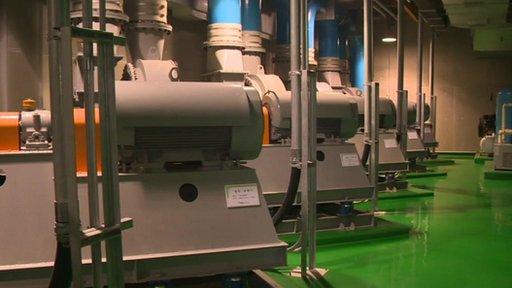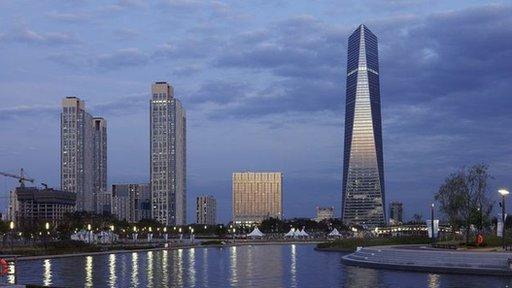Tomorrow's cities: Just how smart is Songdo?
- Published
A look at the newly built city of Songdo in South Korea
As cities around the world look to technology to make themselves "smarter" many are watching Songdo.
Built with smart technologies very much a part of its DNA, it sits adjacent to Seoul, already regarded as one of the hi-tech capitals of the world. So has the experimental city, dubbed by some as a "city-in-a-box" because of its reliance on technology, been a success?
Building a city from scratch offers challenges as well as opportunities.
In South Korea, part of that challenge is to deliver a markedly smarter city than Koreans are used to.
Seoul's underground railway already offers high-speed wi-fi; it is easy to send emails or watch videos while walking along the high street; there are electronic panels at the exits of railway stations, revealing the waiting times for connecting buses; and companies like Samsung are already working on linking household devices to your mobile phone.
So what else can a city like Songdo offer?
Clever rubbish

The waste system sucks rubbish directly from kitchens to a processing centre
On the technological front, a brand new city offers the chance to build some futuristic hardware.
Songdo has been designed with sensors to monitor temperature, energy use and traffic flow. These sensors can - in theory - alert you, personally, when your bus is due. Or let the local authority know about any problems.
A lot of these innovations are designed with the environment in mind - charging stations for electric cars, for example, or a water-recycling system that prevents clean drinking water being used to flush office toilets.
The waste disposal system is also impressive - or it would be if you could see it. Because there are no rubbish trucks trawling the streets or vast bins dotted around blocks of flats. Instead, all household waste is sucked directly from individual kitchens through a vast underground network of tunnels, to waste processing centres, where it's automatically sorted, deodorised and treated to be kinder to the environment.
In future, some of this household waste will be used to produce renewable energy, but - like many of Songdo's technical innovations - it isn't fully operational yet.
And that's because the city is currently less than half full; less than 20% of the commercial office space is occupied, and the streets, cafes and shopping centres still feel largely empty. Cue challenge number two.
Despite being next to South Korea's main international airport, transport links into the capital itself are rudimentary, and the incentives for companies moving to a new smart city don't always outweigh the costs.
Park life

Songdo looks impressive but its streets remain empty
Songdo is nonetheless attracting families and young couples away from Seoul, though not necessarily for the futuristic technology or commercial district.
The city has been planned around a central park, and designed so that every resident can walk to work in the business district. Mrs Kwon moved here from Seoul three years ago and says her daily commute is a 15-minute walk across the park to her job as a translator.

"After lunch I walk with my co-workers in the park - it's an important element in my life now," she told me. "When I lived in Seoul, I had to drive to see my friends, or my son's friends; living here in Songdo, my son can ride his bike to his friends' houses and I can walk to hang out with mine. It's brought me closer to my neighbours."
While the flats are selling well and there is even construction work on new housing areas, Songdo seems to be far less appealing to the corporate market.
One or two pop-up businesses are starting to emerge spontaneously from the empty boulevards and model shop fronts. And that's the third challenge when building a city from scratch: how to create that indefinable buzz - the creative anarchy - of a big bad urban centre?
As Jonathan Thorpe, CIO for the American developer Gale International, which built Songdo, says: "It's the occupants who make a city."
"You're trying to create a diversity and a vitality that organic development creates, in and of itself," he explained, "so it's a challenge to try and replicate that in a masterplan setting. At the same time, with a masterplan you have the ability to size the infrastructure to make sure the city works - now and in 50 years' time."
But fifty years is a long time in South Korea. This is a country that seems to fuel itself on the speed of change. And who knows what Songdo will look or feel like by then.
- Published19 August 2013
- Published27 August 2013